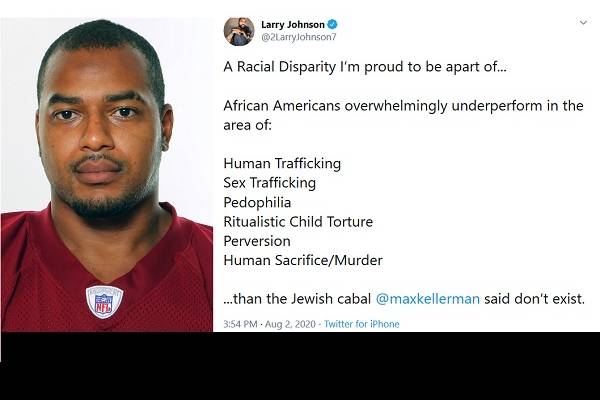Twitter permitted former NFL player Larry Johnson to spread lies about a “Jewish cabal” that carries out perverse crimes like “ritualistic child torture” and “human sacrifice/murder.”
By Yakir Benzion, United With Israel
Despite repeated appeals to common sense to get Twitter to shut down sources of anti-Semitic incitement, the social media giant continues to turn a blind eye to the phenomenon that helps spread hate messages around the world.
On Sunday, former NFL player Larry Johnson, who has an ugly history of posting anti-Semitic tropes and Holocaust denial, was at it again, tweeting that there is a secret “Jewish cabal” that carries out perverse crimes like “Ritualistic Child Torture” and “Human Sacrifice/Murder.”
While there were many responses condemning the anti-Semitic tweet, there was also frustration that Twitter continues to turn a blind eye when it comes to hatred directed at Jews.
“The fact that a former athlete can tweet that a subversive Jewish cabal exists to 140,000 followers and nothing is done by @Twitter is disgraceful,” tweeted Canadian legislator Anthony Housefather.
“Here a high-profile former athlete tells his 146k followers via a verified account that ‘the Jewish cabal’ performs well at ‘ritualistic child torture.’ It’s clear @jack [Twitter CEO Jack Dorsey] has no policy to root out antisemitism on @Twitter, only to respond with token gestures when pressure builds,” tweeted Algemeiner editor-in-chief and CEO Dovid Efune.
The anti-Semitism problem isn’t just from individuals on Twitter, but also reaches the highest levels.
Last week Israeli legislators were outraged after Twitter company official Ylwa Pettersson told the Knesset that Iranian calls to wipe out Israel were just “foreign policy saber-rattling on military-economic issues [that] are generally not in violation of our rules.”
And on Friday, White House Press Secretary Kayleigh McEnany slammed Twitter, saying the social media giant was showing blatant bias by targeting conservatives, especially President Donald Trump.
“I thought it was very eye opening and it tells you where these social media companies stand, where they’re not willing to assess the Ayatollah Khomeini’s tweets but they are willing to assess President Trump’s tweets,” McEnany told a White House press conference.
International human rights lawyer Arsen Ostrovsky was incensed.
“I kid you not! At Knesset hearing on Antisemitism, @Twitter rep tells me they flag @realDonaldTrump because it serves ‘public conversation’, but not Iran’s @khamenei_ir call for GENOCIDE, which passes for acceptable ‘commentary on political issues of the day’,” Ostrovksy tweeted.
